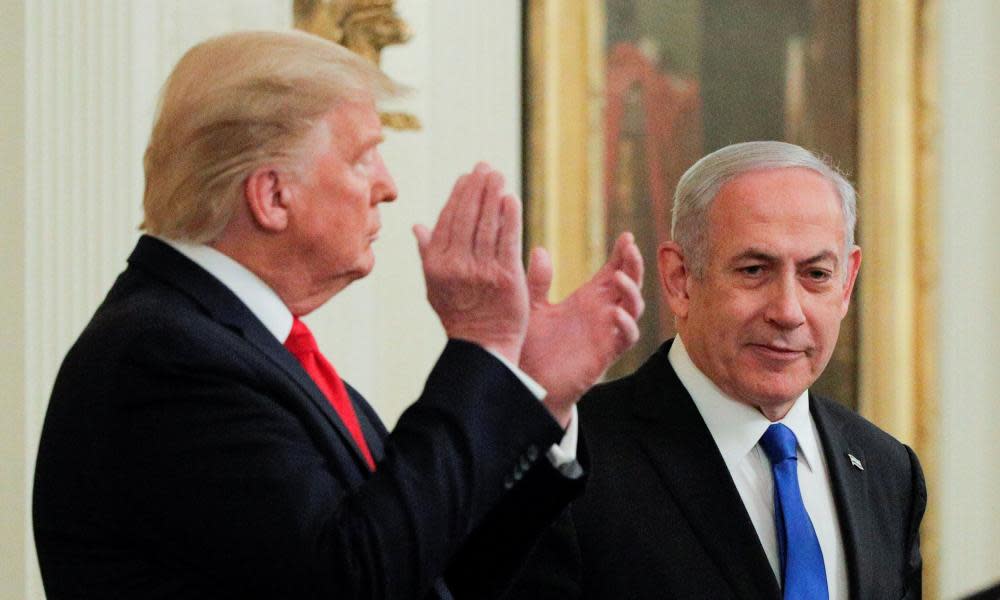Israeli settlers speak out against US-backed annexation plan

Benjamin Netanyahu is facing outspoken resistance to his proposal to annex parts of the occupied Palestinian territories from some of the people the move was advertised as benefiting – Israeli settlers.
The prime minister has pledged to formally extend Israel’s territory over 30% of the occupied West Bank, including all Jewish settlements, as soon as next month, implementing part of Donald Trump’s Middle East “vision for peace”.
Despite the US plan being widely seen as a gift to Israel’s far right and lauded by Netanyahu as a “historic opportunity” for Israel to take the land permanently, settler leaders are fearful of clauses within it that suggest the potential for a Palestinian state.
David Elhayani, the chair of the Yesha Council, an umbrella group representing Jewish settlers, has twice said this week that Trump is no friend of Israel.
“Ultimately, he presented a plan that endangers the existence of the state of Israel and, in that case, you’re no friend of mine,” Elhayani told Army Radio on Thursday.
Trump’s plan offers the potential for Palestinian self-rule, but only after strict conditions are met. It envisions millions of Palestinians living in demilitarised enclaves, mostly surrounded by Israel.
Even so, some settlers have argued Israel should unilaterally annex territory without agreeing to any of the clauses in Trump’s plan that they see as concessions to the Palestinians.
Netanyahu, who met settler leaders this week to hear their grievances, has expressed irritation with Elhayani. “President Trump is a great friend of Israel’s. He has led historic moves for Israel’s benefit,” Netanyahu said in a statement on Wednesday. “It is regrettable that instead of showing gratitude, there are those who are denying his friendship.”
The speaker of Israel’s parliament, Yariv Levin, a Netanyahu ally, said Elhayani’s remarks were “rude and irresponsible”.
Under a unity government deal signed with his former political rival Benny Gantz, Netanyahu has pushed to bring plans for annexation to the cabinet for discussion as soon as 1 July.
Speaking in the Knesset before being sworn in last month, Netanyahu said the move would be “another glorious chapter in the history of Zionism”.
However, much uncertainty remains around whether Netanyahu will move ahead swiftly, and whether he wants to take such a controversial and potentially explosive step so soon after retaking office.
Israeli forces captured the West Bank from Jordanian forces in 1967, although Palestinians have limited self-rule over some parts. Today, Israel retains control over the West Bank areas it plans to annex, and settlers enjoy the same rights and most of the services as Israelis living in Israel – some argue Israel has de facto annexed the territory already.
Meanwhile, the country is enjoying a period when many world powers, including some Arab states, are curtailing their public criticism following half a century of occupation.
Netanyahu has long boasted that he sidelined the Palestinians on the world stage, and annexation could threaten that. The Palestinian leadership, which pre-emptively rejected Trump’s plan as biased, has recently launched a campaign to draw up international pressure.
Anshel Pfeffer, a journalist for the Haaretz newspaper, wrote that Netanyahu might in fact welcome the settler disagreements as he could use it as a “smokescreen” to postpone the move.
“He talks of July 1 as an ‘unmissable’ date but won’t detail how he plans to extend Israeli sovereignty. There’s no map. No draft legislation. No timetable,” said Pfeffer, who wrote a biography on Netanyahu. “Ultimately, the difference between Netanyahu and the settlers’ aims are that his is a personal-political project dedicated to perpetuating his hold on power.”
Questions have also been raised around whether Washington backs unilateral moves. While the US secretary of state, Mike Pompeo, has said annexation is ultimately “an Israeli decision”, local media have reported that US officials want to slow the process while it deals with domestic protests and the coronavirus pandemic.

 Yahoo News
Yahoo News 
